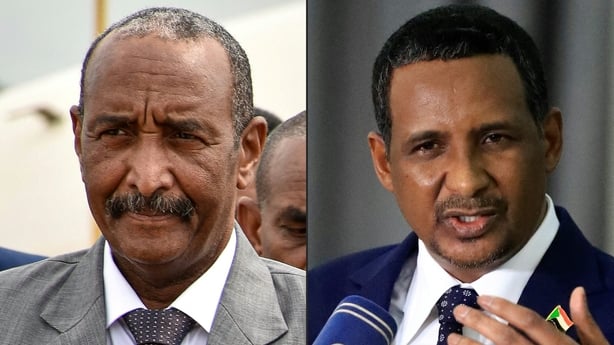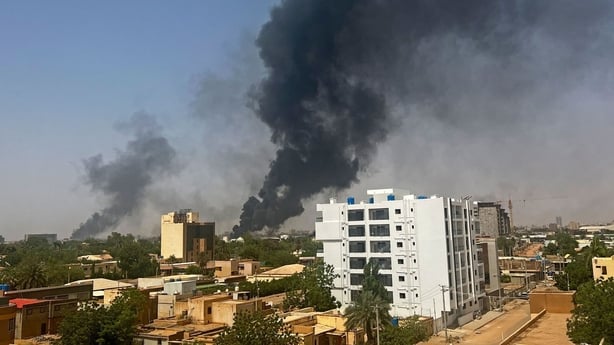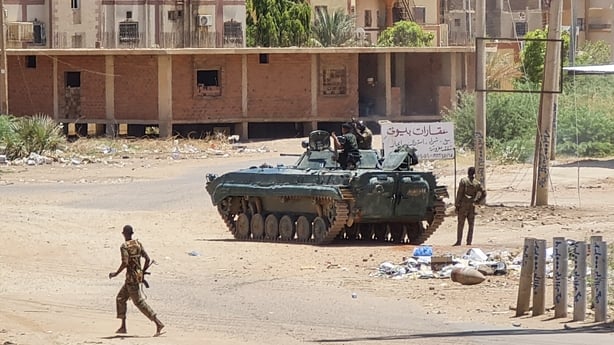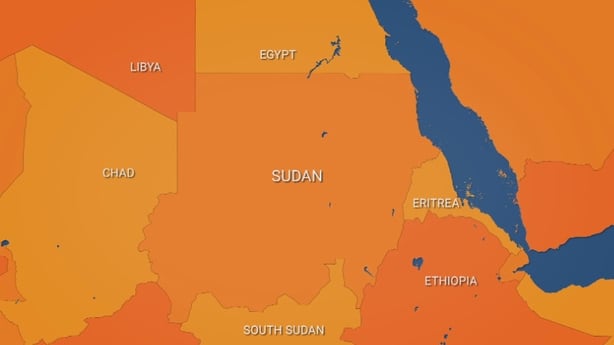Irish diplomat Aidan O'Hara, who was held at gunpoint when his residence was attacked in the opening days of the conflict in Sudan, has been describing his experience and his dramatic evacuation from the country.
Mr O'Hara, a former Irish ambassador to Ethiopia and currently the European Union's ambassador to Sudan, said armed paramilitaries burst into his residence in the capital Khartoum and held him at gunpoint.
It is understood the group was looking for cash and mobile phones.
Mr O’Hara said he was unhurt in the incident but that it was "unpleasant".
However, during a fraught evacuation through a Sudanese airbase Mr O’Hara’s diplomatic convoy was attacked and a French soldier injured.
Speaking to RTÉ News in Brussels, Mr O’Hara said he had sought better protection for EU embassies in Khartoum the day before the conflict erupted, on 15 April.
Recalling the day his home was attacked, he said: "I was held at gunpoint. Actually, it lasted about 45 minutes. I wasn't alone: there were multiple violations of the Vienna Convention."
"Talking to my colleagues, the other European Union ambassadors, very few diplomatic premises were untouched, even in those early days, whatever about now," he stated.
"Ironically, I had spoken to the [Sudanese] foreign ministry just the day before looking for more protection for diplomatic premises. But then the conflict just became chaotic," he said.
58-year-old Aidan O'Hara was born in Dublin and is a career diplomat with the Department of Foreign Affairs.
He took up his post as EU ambassador to Sudan last September.
He said transition towards civilian rule, following a military coup in 2021, had been underway when he arrived and he was involved in the process to help get civilian involvement in government and to prepare elections.
Mr O'Hara said: "It’s been a very painstaking process. Since September, it's been led by a facilitation process called the tripartite mechanism, which was the UN, the African Union, and then the regional organization for the Horn of Africa known as IGAD."
"As multilateralists, the European Union has always felt that this was the thing to support," he noted.
"It did actually come very close to concluding the agreement. And then 15 April happened and it's been a tragedy ever since," he added.

One week before the conflict erupted Ambassador O’Hara had been in touch with the two main combatants - General Abdel Fattah al-Burhan, head of the army and leader of Sudan's ruling council since 2019 and his deputy on the council, Rapid Support Forces (RSF) leader General Mohamed Hamdan Dagalo, commonly known as Hemedti.
"We were in constant touch with the parties. What we felt was that they were still talking, sometimes not directly to each other," he said.
"I met General Burhan and General Hemedti a few days before 15 April. I was talking to the civilian people, just the day before on 14 April. At that stage, we were looking at ways to try and circumvent an issue between the two generals that would keep the civilian process on track," he stated.
"Then everything came apart on the morning of 15 April," he added.

Mr O’Hara said he had clear memories of the conflict, which has since claimed hundreds of lives, erupting.
"It's certainly not unusual, because there are many armed groups in Khartoum, to sometimes hear volleys of gunfire," he told RTÉ News.
"But on 15 April it was volleys of gunfire quite close to the house, followed by explosions, followed by a lot of black smoke. So that was quite a clear signal that everything had changed," he said.
The ambassador said he and his wife, Isabel, had planned to go on holiday, but that by chance she had gone on ahead of him before the conflict broke out.
The attack on Mr O’Hara’s residence, which is close to both the airport and the military headquarters of the Sudanese Army, happened two days after the conflict began.
It’s understood armed men fired shots in the air at the entrance to the residence, prompting the security guards to seek safety.
He told RTÉ News: "I'm not going to say everything about [what happened] because I know the people involved in terms of who was responsible."
"The important thing for me afterwards is that I'm fine and I was unhurt," he said.
"It wasn't a pleasant experience, obviously but it was not the most stressful thing that happened to me," he added.
He said the most stressful period was the 10 days after the conflict erupted.

"Like everybody else in Khartoum and elsewhere in Sudan what was more stressful was being at home, with bombs falling and gunfire on the streets, on either side of the house," he said.
Mr O’Hara said: "I wasn't unique in that. I consider myself very fortunate now to be out of Khartoum, I'm still trying to work on the political process, to get the civilian move back on track."
"But I'm very relieved that I was unhurt," he added.
Mr O’Hara thanked friends, family members and colleagues who had tried to get in touch to offer their support and concern.
He said he wanted to express "a very big thank you to so many people who reached out through a variety of means to see whether I was okay and to inquire about my welfare and to give me support.
"I think of my colleagues in the [EU] External Action Service, my colleagues in the Department of Foreign Affairs, the Tánaiste, but so many friends, so many people who I've met at some point in the past, even going back to my school days, who have some time somehow managed to find me and I'm very grateful for that," he said.
Mr O’Hara stated he had tried to personally acknowledge all the messages of support but that it had been overwhelming.
He recalled the fraught process of being evacuated by convoy with other diplomats after 10 days of virtual incarceration in his residence to an airbase where they would be airlifted by a French aircraft.
He described the journey as being through a "semi-permissive environment", meaning there was permission on paper from the combatants to get to the airbase to fly out of Sudan, but "you have to be careful that what was decided on paper was respected, and [it wasn’t always] the case."
France, the Netherlands, Germany, Italy and Spain had provided aircraft, while Spain had provided a naval vessel for evacuation from Port Sudan.
"During the transfer to the airbase, one French military was injured," he recalled.
"During the convoy there was a bomb dropped not on the convoy, but near the convoy. This was obviously a consular operation, but it was also a military operation. And it had to be conducted in very, very strict terms," he noted.
Mr O’Hara said 1,700 EU citizens had been evacuated, including 250 Irish citizens.
"That was managed, in not very easy circumstances, by the Embassy of Ireland in Nairobi and by the Department of Foreign Affairs and it's a credit to the effort they put in that so many people were evacuated," he stated.
Mr O’Hara will be continuing his political and diplomatic activities in Brussels.
He said the prospects for the conflict deepening and drawing in regional actors was real.

"Sudan is [a country of] 43 million people plus it has a long coastline on the Red Sea.
It has borders with seven other countries.
It is a key country in the Horn of Africa and beyond looking further west as well.
He said there had been hopes that a more hopeful trend in Somalia and Ethiopia would extend to Sudan, with the EU and other international actors re-engaging with the country following the military coup.
"We were already planning a re-engagement to really start transforming the country and obviously we're unable to deliver on any of that right now," Mr O’Hara said.
"So much of what happens in Sudan has repercussions with so many countries in the region," he added.
Despite his experience, Mr O’Hara said he hoped to return to Sudan soon.
"The Sudanese people are fantastic, they’re very hospitable. I'm looking forward to getting back to being there and to seeing colleagues and just getting back to Khartoum and seeing how people are getting on," he said.
"I doubt if it will be a place where families of diplomats will be going back to soon," he remarked.
Mr O’Hara said: "I hope we can come back to Khartoum. That's the ambition, to be there on the ground. But just have to see what happens in the coming weeks before we can make a call on that."
"Everything comes back to a ceasefire and ending this conflict," he concluded.







